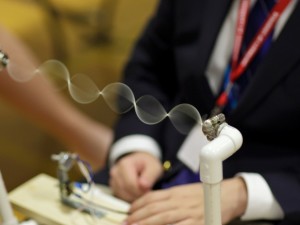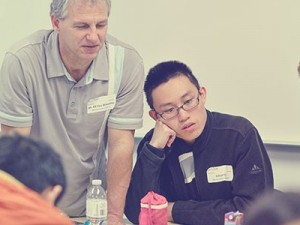
Despite the sense of authority that attending Yale University stows upon me, I certainly don’t have it all figured out. The guidance I’m sharing is the same advice I continue to tell myself in college. This advice is not geared towards the goal of helping you craft the perfect résumé, or become valedictorian, or get into Yale. Instead, I hope that these words encourage you to simply be a happy, healthy, and engaged student of not just a classroom but the world at large.
Be Competitive… with Yourself!
I can’t even begin to count the number of people I’ve seen struggle with no longer being the best at everything in college. These were the people who were always comparing test scores in high school and cheering when a smart peer did worse than them. Competition tends to breed isolation, which isn’t particularly helpful in a world that places increasing emphasis on collaboration to tackle large issues.
Challenge yourself to not be better than the person next to you, but the person you are at this very moment. Set your goals in terms of your own personal growth, and if, at the end of the day, you can be satisfied with your own development, regardless of your grade or your peers, you’ll be a happier and healthier person.
So how might you resist that urge to compare yourself to your peers and secretly hope that they perform worse than you? Collaborate with them. Take advantage of each other’s strengths and successes. Not only does this make studying more enjoyable, but you’ll become exposed to interesting ideas and questions you never thought to ask.
Embrace Mistakes
Don’t lie. I know you have that test that you quickly stuffed away into your backpack, hoping to avoid confronting all of those wrong answers and red pen. Yes, the shame and disappointment from not doing as well as you had hoped hurts, but ignoring your mistakes is the worst thing you could do. Mistakes help identify specific areas of improvement. Even your “dumb mistakes” are not inevitable and have possible solutions. Perhaps you skimmed the instructions too quickly and didn’t do what it asked of you. Make a physical note of ways you can improve for next time, e.g. read the instructions fully, and underline key words that help emphasize what you are trying to answer. If it was not a “dumb mistake” but an issue of understanding content, make a note to practice that concept again. Skills and ideas often build upon each other, so you can’t get away with ignoring a problem area just because it’s a different test.
And most importantly, don’t dismiss your inadequacy in a subject, because you don’t have the “genes” or inherent talent for it. A motivated attitude combined with deliberate practice is more important than any combination of nucleotides. It may be painful to confront your mistakes head on, but as you become more used to viewing them as helpful tools for specific improvement as opposed to sources of shame and embarrassment, you will bounce back from your mistakes much more easily and are less likely to repeat them. Plus, the more quickly you identify small areas to work on, such as a wrong answer on the homework or a confusion during class, the less often you will perform poorly on an important test.
It is perfectly okay to be wrong, and failure can be one of your most important experiences. Failure shows you are taking risks and challenging yourself to grow in new and unfamiliar territories. As that swell of shame creeps up when something doesn’t work how it should, remember that the patterns with which you respond to your mistakes will define you far more than could any arbitrary score on an assignment.
Be a Proactive Learner Outside of Class
I don’t mean that you need to be leading 10 co-curriculars and constantly in a structured activity. But be curious and explore the things you love in a way that is enjoyable to you. That could mean reading the latest news or blogs on art, science, or social justice. It could mean going to a local film festival with your friends. It could mean joining the debate team or learning how to remix music or making fractal artwork or starting a Tumblr blog on spelunking. With the internet at your fingertips, you can pursue almost any interest on your own terms and on your own time.
Connect Schoolwork to Personal Interests
You may find that as you explore your interests that connections to your schoolwork manifest naturally, but if it doesn’t, you may just have to tweak the way you think about what you like to do. For example, let’s say you have to write a research paper on anything you want during Japan’s Meiji era, but all you’re really interested in is modern day action movies. Try to think more broadly – what is it about these films that interest you the most? If it’s the special effects, you could research the Meiji Era’s innovative developments in kabuki (Japanese theater) production. If you like to think about film as a reflection of society, you can consider how current political events affected the content matter of the plays. If it’s the action itself, perhaps you’d find the Japanese military and the Sino-Japanese war interesting. Or if you simply like to watch movies, you can conduct research by watching documentaries instead of only reading books and articles.
While you may not always find a direct connection to a specific interest you have, if you try to think broadly about what you like to do and apply it to a project, you’re much more likely to enjoy your work and do a better job. Research and open-ended projects are always great opportunities to personalize your learning with your interests, but you can also find small ways to integrate your passions in other everyday class settings. For example, if you’re passionate about gender studies, you can do a critical literary analysis of the language surrounding gender and sexuality in the Shakespeare play you’re reading for class. What you study in school doesn’t have to counter your personal hobbies or feel abstract and inapplicable to your life; it can be rewarding and enjoyable if you are proactive in finding ways to steer what and how you learn towards your passions.
Your Health Comes First
Yes, your work in high school is important. It may determine what college you’ll go to and what scholarships you’ll get, but even so, I still adamantly say your health comes first. Attending Yale and a high school where every person was in exclusively IB courses, I’ve long been engulfed by a culture of stress, a culture where relaxation meant you weren’t doing enough, a culture where you compete for who studied the most and slept the least. These zombie students tend to be less focused on gaining a deep understanding and more focused on quantitative benchmarks: their score, their GPA, the number of pages they have to skim through, the number of minutes they have until the next task. When you’re up until 3 AM for the third consecutive night and you’re miserable and your body is fatigued but your mind is racing because you need to study more for that history quiz and do more practice problems for your math test and review new vocabulary for Span– stop, stop, stop. Breathe. Go to bed.
It’s not healthy, mentally or physically, to deprive yourself of sleep and livelihood for academics. You’ll lack the energy to focus and engage at school. You won’t be happy even if you get that A, because you’ll still be on edge for that next test. In the grand scheme of things, one test score is so trivial. Believe me; I speak from experience when I say you can bounce back from a failing test score. Be able to let go of the little things, plan ahead so you don’t have to pull all-nighters, and don’t overwhelm yourself with co-curriculars. Listen to your body, embrace free time, don’t glorify stress, and please check in with your friends to encourage them to be healthy. If you find yourself so overwhelmed with school and academic pressure, talk to an adult at home or school that you trust; it should never be shameful to ask for help.
Your success as a student should not be measured by your GPA, your SAT score, or the number of awards sitting on your mantelpiece. Whether you are pulling in straight A’s or aiming for the Honor Roll, leading five clubs or a member of two, winning a competition every other week or working a part-time job, if you are healthy, happy, intrinsically motivated to learn, and developing as an individual, you are an excellent student and on your way to being an engaged life-long learner.







